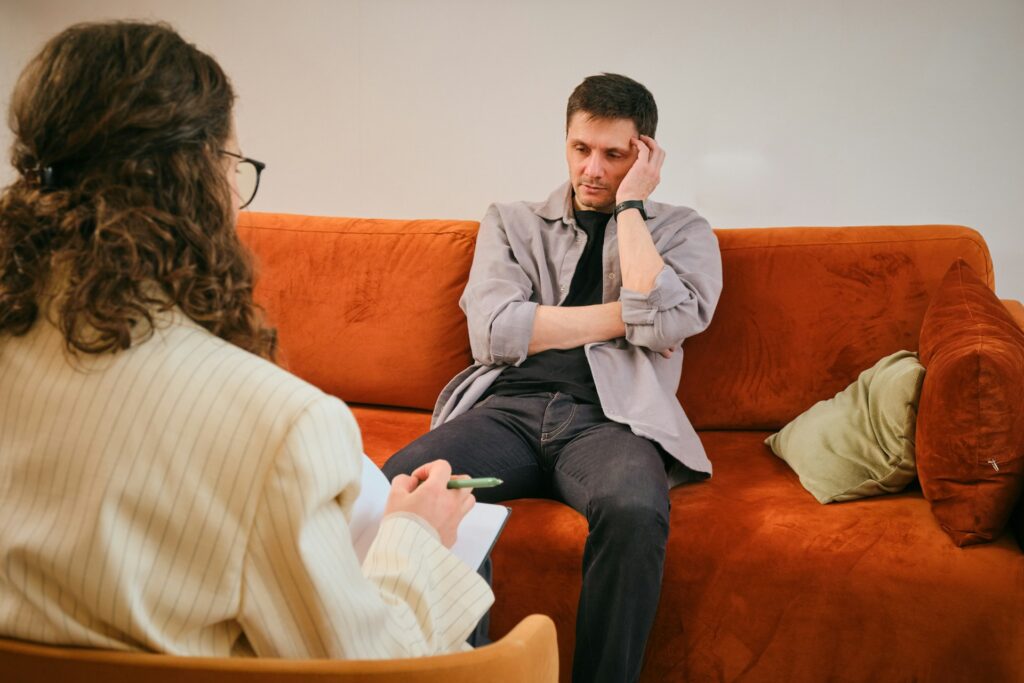Therapy gets talked about a lot these days, but there’s still a fair bit of confusion around what it actually involves.

Some people imagine a dramatic, movie-style breakthrough every session; others think it’s just paid chatting. The truth sits somewhere in between. Whether you’re considering it or just curious, you should at least be prepared for what you can expect from the practice, and what you shouldn’t bet on happening during your sessions. It can be incredibly beneficial if you go into it with the right mindset.
1. Therapy is a space to unpack safely.

At its core, therapy offers you a place to talk about the things you usually filter or hold back. It’s a space where you can say what you actually think, not just what you think people want to hear. That safety isn’t just emotional—it’s structured. You’re not expected to perform or fix everything. You’re allowed to take your time, say the messy stuff, and know it won’t be used against you later.
2. Therapy isn’t someone telling you what to do.

Therapists aren’t advice-givers or decision-makers. They’re not there to tell you who to date, what job to take, or how to live your life. Their job is to help you get clearer on what you want, and why. They may challenge your patterns or offer perspective, but they won’t give you a step-by-step manual. If you’re expecting a therapist to fix your life for you, you might walk away disappointed.
3. Therapy is a commitment, not a quick fix.

One session won’t change everything. Progress is often slow, subtle, and non-linear. You might have moments of clarity, but most of the work happens in the in-between—when you start applying what you’ve uncovered. Consistency is what matters most. Showing up, even on the weeks you feel fine or unsure, builds the kind of trust and momentum that leads to real, lasting shifts over time.
4. Therapy isn’t just talking about your childhood.

Sure, your past comes up—it’s part of the puzzle. However, modern therapy is about more than analysing what happened when you were five. It’s about how those past dynamics show up in your present life. You’ll explore patterns, triggers, and emotional responses that help you understand what’s going on right now. It’s not just a history lesson; it’s a way to connect the dots so you can respond differently moving forward.
5. Therapy is about understanding your patterns.

It helps you notice what you keep doing without meaning to. Whether it’s people-pleasing, shutting down in conflict, or feeling guilty when you rest, therapy brings those patterns to the surface. That awareness is powerful. Once you see what you’re doing and why, you can start making choices that align more with who you want to be, not just what you’ve always done.
6. Therapy isn’t always comfortable.

It’s not supposed to feel like a chat with a friend. Sometimes it stings. You might hear things you don’t want to hear, or notice things about yourself you’ve been avoiding for years. Of course, discomfort isn’t the enemy. It usually means something real is happening. The goal isn’t to avoid hard moments; it’s to move through them with more honesty and support than you’ve had before.
7. Therapy is a relationship.

You and your therapist build something together over time. Trust isn’t automatic—it grows session by session. The more honest you are, the more useful the work becomes. It’s okay if it takes a while to open up. The therapeutic relationship itself often becomes a mirror for how you show up in other areas of life, which can be incredibly revealing all on its own.
8. Therapy isn’t just for people in crisis.

You don’t have to be falling apart to go to therapy. In fact, some of the best work happens when things are relatively stable because you’ve got the bandwidth to explore, not just survive. Waiting until everything’s on fire might get you in the door, but it’s not the only reason to go. Therapy can be proactive, not just reactive. It’s not about how “bad” things are; it’s about how willing you are to grow.
9. Therapy is a place to practise being real.

We all perform a bit in everyday life. In therapy, the masks come off—or at least start to slip. You can be messy, uncertain, contradictory, or flat-out confused without anyone rushing in to fix it. That kind of honesty can feel unfamiliar at first, especially if you’re used to keeping things together. As time goes on, though, it creates space for real connection—with yourself, and with other people.
10. Therapy isn’t the same as venting.

It might start with a rant or a bad week, but therapy isn’t just about offloading your frustrations. A good therapist will listen, yes, but they’ll also guide the conversation toward insight, not just release. If you find yourself telling the same story every week without any shift in understanding, that’s a sign something deeper might need to be addressed—and your therapist will help you get there.
11. Therapy is a form of self-respect.

Choosing to go to therapy isn’t weak. It means you’re taking yourself seriously enough to invest time and effort into understanding your inner world. That’s something to be proud of, not ashamed of. It’s a quiet kind of empowerment. Not loud or flashy. Just you, showing up for yourself, even when it’s hard, even when it’s slow. That kind of care adds up in ways that aren’t always visible, but deeply felt.
12. Therapy isn’t a place for judgement.

Whatever you’re carrying—shame, confusion, anger, even numbness—your therapist isn’t there to judge you. They’ve heard more than you think and are trained to hold space for all of it, without flinching. If you’ve spent years censoring yourself, therapy can be the first place where you let your guard down. While that might feel scary at first, it also makes room for real healing to begin.
13. Therapy is about finding your own voice.

You don’t go to therapy to become someone else—you go to remember who you are underneath all the noise, pressure, and conditioning. It’s about reconnecting to what matters to you, not what you’ve been told should matter. As you find that voice, decisions start to feel less overwhelming. Boundaries make more sense. Life becomes less about performing and more about choosing what feels true.
14. Therapy isn’t something you have to do forever.

Therapy isn’t a life sentence. Some people go for a short time, others return in seasons. The idea is that you build tools and insight you can take with you, even after you stop going regularly. What matters is that you feel supported, seen, and equipped. If therapy helps you get to a place where you can trust yourself again, then that’s the point. It doesn’t need to be endless to be worthwhile.


